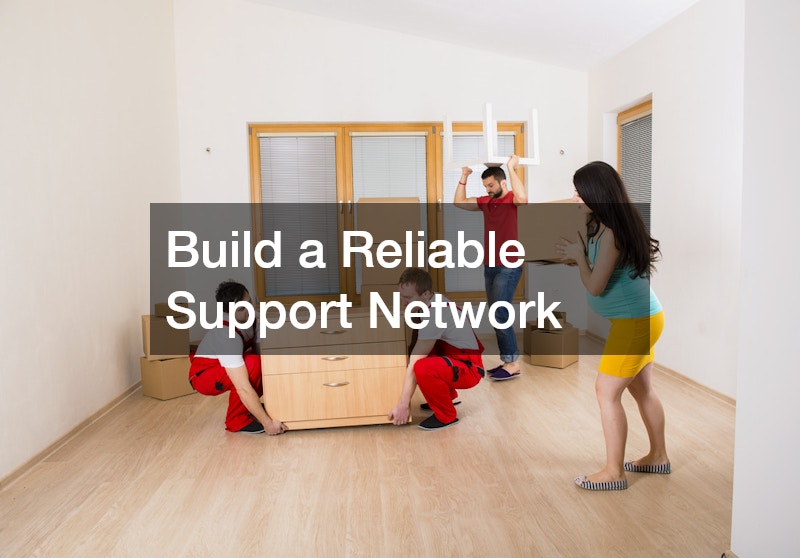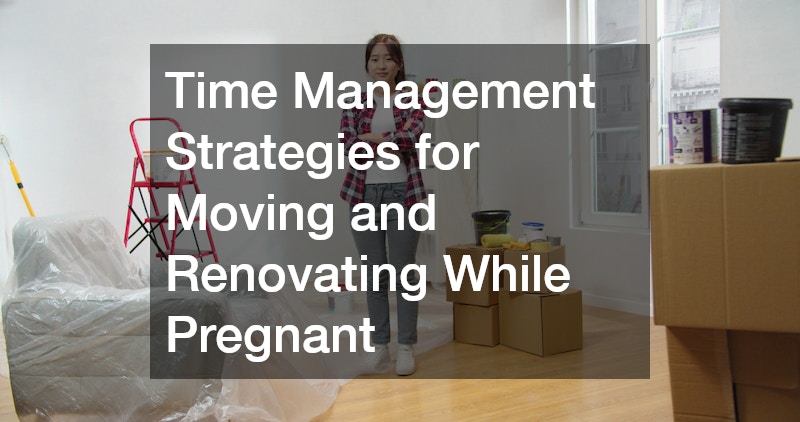Moving into a new home while preparing for a baby can be both exciting and overwhelming. Expecting parents often find themselves juggling multiple responsibilities, from packing boxes to coordinating renovation projects, all while keeping prenatal health a priority. Effective time management is crucial in this scenario to reduce stress, maintain energy levels, and ensure that both the home and personal well-being are properly taken care of.
A common challenge is that traditional moving timelines rarely align with the slower, more cautious pace often required during pregnancy. Expectant parents may find themselves fatigued, experiencing unexpected medical appointments, or simply needing more downtime than usual. Without a clear plan, small tasks can quickly escalate into stressful situations that affect both the household and the pregnancy. Prioritizing tasks, setting realistic deadlines, and strategically delegating responsibilities become essential skills for anyone in this situation.
In addition to physical preparation, mental organization plays a significant role. Expectant parents often have to coordinate with contractors, movers, and vendors while also considering nursery arrangements, baby-proofing, and health precautions.
Organize Your Tasks in Stages

Breaking large projects into manageable stages is key to reducing overwhelm during a move and renovation. Start by creating a comprehensive list of tasks, separating them into pre-move, during move, and post-move categories. Assign realistic deadlines for each stage, taking into account your energy levels and prenatal appointments. This approach ensures that every task is manageable and reduces the risk of last-minute chaos.
An outlet surge protector can be a small but important addition during this period. Protecting electronics from unexpected surges can prevent unnecessary stress and reduce the risk of last-minute equipment replacement while preparing for a baby. Having reliable tools and devices ready allows you to focus on tasks that require more attention without worrying about technical interruptions.
When assigning tasks, consider which ones can be handled by partners, family, or professionals. Delegating responsibilities such as packing, organizing supplies, or coordinating with contractors can make a significant difference in overall efficiency. Utilize digital planning tools and calendars to track deadlines and progress. Not only does this approach reduce mental clutter, but it also ensures that no important task is overlooked.
Staging tasks in manageable increments also allows for flexibility. If a prenatal appointment or unexpected fatigue disrupts your schedule, you can easily adjust your plan without causing a domino effect. Clear organization of tasks ensures that each step contributes to a smooth and well-coordinated process while preparing for a baby.
Prioritize Safety First
Safety considerations become even more crucial when navigating moving and renovation projects during pregnancy. Always assess potential hazards before starting a task. Keep floors clear, handle heavy lifting with care, and ensure that all tools and equipment are in proper working order. Safety planning reduces both physical risks and stress levels during this busy period.
A residential roofing company can play a pivotal role if your renovations involve roof work. Engaging professionals not only ensures safety but also allows you to focus on other essential tasks. While preparing for a baby, avoiding high-risk activities and relying on licensed contractors helps prevent accidents that could compromise your health or the home project timeline.
Another key consideration is scheduling renovation work around your pregnancy needs. Avoid tasks that expose you to harmful chemicals, excessive dust, or strenuous physical activity. Having a clear plan for what you can handle personally versus what should be delegated to professionals is essential.
Finally, implement simple safety measures throughout the home. Baby-proofing areas early, marking hazardous zones, and creating clear walkways for movers or contractors keeps everyone safe. Prioritizing safety allows you to manage the moving and renovation process efficiently, while ensuring your well-being during the crucial stages of preparing for a baby.
Build a Reliable Support Network

Having a dependable support network can dramatically ease the stress of moving and renovating while pregnant. Family, friends, and neighbors can provide practical assistance such as packing, transporting items, or supervising renovation activities. Clear communication and delegation are key to maximizing the effectiveness of your support system.
Using a local moving service can simplify the physical challenges of relocation. Professional movers help reduce heavy lifting and logistical stress, leaving you more energy to focus on essential preparations. Coordinating with a reliable local moving service is particularly beneficial when preparing for a baby, as it allows you to focus on nursery setup, organization, and self-care.
Additionally, online communities and social networks can offer advice and resources for managing time during a move. Connecting with other expectant parents who have experienced similar situations can provide practical insights, reassurance, and even vendor recommendations.
Leveraging a support network ensures that you are not carrying the burden alone. With clear communication and professional assistance, expectant parents can maintain momentum on their projects while also protecting their physical and emotional well-being during this critical period.
Streamline Packing and Storage
Packing efficiently is one of the most time-consuming aspects of moving. By using a strategic approach, you can save both time and energy. Start by decluttering items that are not essential, and organize boxes by category. Labeling boxes clearly will make unpacking smoother, particularly when prioritizing items for the nursery.
A central vacuum company can be a valuable investment during this phase. Clean floors and surfaces efficiently, even in spaces that are under renovation, which minimizes exposure to dust and allergens while preparing for a baby. This also allows for a safer, more hygienic environment for newborn essentials.
Consider creating a “baby essentials” box that contains items you will need immediately after the move. Packing these items separately ensures you can access them without unpacking multiple boxes. Employing time-saving techniques such as color-coded labels or room-specific packing lists can dramatically reduce stress.
By streamlining packing and storage, you not only save time but also create a more organized, baby-ready home. Efficient organization ensures that when your little one arrives, essential items are accessible, and the home environment is safer and more functional.
Schedule Renovations Strategically
Timing is everything when it comes to renovation projects during pregnancy. Identify which renovations are essential before the baby arrives and which can wait. Plan projects in phases, tackling high-priority areas such as the nursery, kitchen, or bathroom first.
Home improvement professionals can help accelerate timelines and ensure quality outcomes. By hiring experienced teams, you reduce the risk of delays and prevent the stress associated with DIY errors. Careful planning allows you to focus on preparing for a baby while projects move forward efficiently.
When scheduling renovations, account for factors like contractor availability, delivery times for materials, and your own health and energy levels. Avoid back-to-back high-intensity tasks, and always allow buffer days for unexpected delays. Coordinating work in a strategic sequence ensures that you maintain momentum without compromising safety or well-being.
Smart scheduling also allows time for inspection and quality checks. By breaking projects into manageable phases, you reduce both stress and the likelihood of mistakes. This approach ensures that your home is fully prepared for your new arrival in a safe, timely, and organized manner.
Implement Time-Saving Routines
Developing routines during a move and renovation can save significant time and energy. Create daily and weekly schedules that allocate specific time slots for packing, coordinating with contractors, and managing prenatal needs. Consistency reduces mental clutter and allows for better planning.
While preparing for a baby, consider implementing routines such as pre-packed meals, scheduled rest periods, and regular exercise to maintain energy. These habits help sustain stamina during physically demanding tasks.
Small time-saving strategies, like grouping similar tasks together or setting up temporary workstations, can dramatically improve efficiency. Digital tools such as shared calendars or task management apps also enhance coordination between all parties involved.
By embedding routines into your schedule, you create a rhythm that balances moving, renovating, and pregnancy needs. Over time, these habits reduce stress, increase productivity, and ensure that no essential task is overlooked while preparing for a baby.
Plan for Electrical and Safety Needs
Ensuring that your new home is safe and functional is critical during a move and renovation. Installing an outlet surge protector is a small yet significant step in safeguarding electronics and appliances, particularly in spaces that will be used for baby-related tasks.
Planning electrical upgrades in advance prevents last-minute emergencies and reduces stress while preparing for a baby. Ensure that all outlets are child-proofed and easily accessible for essential devices like monitors, lamps, and medical equipment.
Working with licensed electricians or professionals ensures that installations meet safety standards. Scheduling these upgrades early in the moving process allows you to focus on other tasks without worrying about hazards or technical issues.
Proactive planning of electrical and safety needs creates a stable, functional home environment. It allows expectant parents to prioritize other renovation or organizational tasks, knowing that key safety concerns are already addressed.
Keep Air Quality in Mind

Renovation dust, paint fumes, and other indoor pollutants can affect health during pregnancy. Implementing strategies to improve air quality is essential when preparing for a baby. Air conditioning services can help maintain a clean, comfortable environment, ensuring proper ventilation and filtration throughout the home.
Use air purifiers and ensure that HVAC systems are cleaned and functional to reduce allergens. Planning renovation work during times when you can leave the house for fresh air also minimizes exposure.
Maintaining healthy air quality is especially important for expectant parents. Poor air quality can impact both energy levels and overall well-being, making it harder to manage daily moving and renovation tasks. By addressing this early, you ensure a safer and more comfortable environment for both parents and newborn.
Don’t Forget Fire Safety
Fire safety is a crucial consideration during renovations and moves, particularly when preparing for a baby. Ensuring that your home has a functioning fire alarm company in place and scheduling a chimney sweeping service adds layers of protection for both your family and property.
Test alarms, replace batteries, and establish an emergency evacuation plan before completing the move. This step ensures that safety is prioritized amid the chaos of renovations and unpacking.
Additionally, coordinate fire safety planning with contractors to ensure that all work complies with safety regulations. Creating safe zones, keeping flammable materials away from living spaces, and maintaining clear exits helps reduce risks. By incorporating fire safety into your moving and renovation plan, you can focus on preparing for a baby without worry.
Build Flexibility into Your Schedule

Despite careful planning, unexpected delays are inevitable when moving and renovating. Weather conditions, contractor availability, or personal health can impact timelines. Building flexibility into your schedule allows you to adapt without causing major disruptions.
Preparing for a baby requires a certain level of adaptability. By anticipating potential challenges, you can create contingency plans, such as temporary childcare, alternate workspaces, or backup accommodation for urgent tasks.
Flexibility reduces stress, prevents burnout, and ensures that essential tasks are completed safely and effectively. Prioritizing the most critical activities while maintaining a buffer for adjustments helps expectant parents navigate the moving and renovation process with confidence.
Moving and renovating while preparing for a baby is undoubtedly a complex undertaking, requiring careful planning, delegation, and time management. From organizing tasks in stages to prioritizing safety, each step plays a vital role in creating a seamless transition for both parents and newborn. By breaking projects into manageable increments, you reduce stress, minimize fatigue, and maintain a clearer sense of control during a period that can otherwise feel overwhelming.
Engaging professionals, such as a residential roofing company, air conditioning services, a local moving service, or custom home builders, allows expectant parents to focus on critical tasks while leaving complex or hazardous work in capable hands. Each service not only saves time but also enhances safety and ensures quality results, which is especially important when preparing for a baby. Small additions, such as outlet surge protectors, central vacuum systems, and local gas fireplaces, further improve convenience, efficiency, and comfort throughout the home.
Proper planning and thoughtful execution reduce stress, increase efficiency, and allow families to focus on the excitement of their growing household. Preparing for a baby does not have to be overwhelming; with intentional action, a clear plan, and the right support, moving and renovating can be a rewarding and positive experience.
